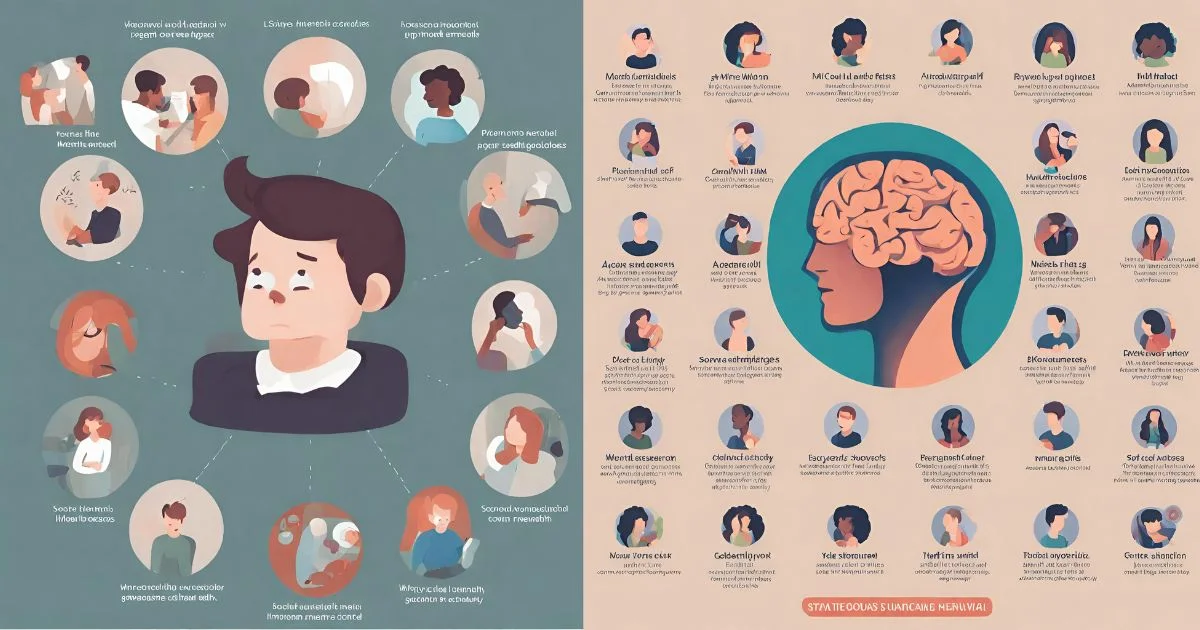Mental awareness refers to our ability to observe and understand our own thoughts, emotions, and behaviors. Developing greater mental awareness can help us lead more fulfilling, self-aware lives. Here are some key components of mental awareness and tips for cultivating it: Mental Health Awareness and Mental Health Warriors allows us to wake up from unconscious patterns that restrict our potential. By courageously exploring our inner landscape, we gain self-knowledge, clarity and freedom.
Read More: Mental Health Disorders Disturbed Everyday Activities
Self-Reflection and Mental Health Awareness and Mental Health Warriors

The foundation of mental awareness is self-reflection or introspection. This simply means taking time to think about your thoughts, emotions, and actions without judging yourself. Set aside 5-10 minutes each day to check in with yourself. You can ask yourself questions like:
What thoughts and feelings are prominent for me right now?
– How am I behaving or interacting with others lately?
– What motivates certain behaviors or reactions?
– Are my current patterns of thinking and acting aligned with my values and goals?
Getting into the habit of regular self-reflection helps you tune into your inner world. Over time you gain deeper insight into your mental patterns.
Mindfulness

Mindfulness means paying attention to the present moment without getting caught up in judgments. Practicing mindfulness meditation even for short periods can enhance mental awareness. Sit comfortably and focus on your breath or a sensory object like sound. When your mind wanders, gently bring it back to the present. Starting with 5-10 minutes once or twice a day can make a difference.
Mindfulness in daily life also boosts self-awareness. You can apply mindfulness to routine activities by fully focusing on the task at hand. For example, when washing dishes, pay close attention to the sensations of the water’s temperature, the soap’s aroma, the scrubbing motion. This trains your brain to be more present.
Self-Monitoring

Self-monitoring means observing your thoughts, feelings and actions so you can spot helpful and unhelpful patterns, For example, you might record your mood several times a day on a scale of 1-10. Note any associations between your mood and thoughts, behaviors or events. Self-monitoring gives you concrete data to reflect on.
You can also monitor thought patterns such as self-criticism. Notice when your inner voice uses harsh language like “I’m so stupid” or “I’m a failure.” Then consciously cultivate more compassionate self-talk. Monitoring and adjusting thought patterns builds mental awareness.
Journaling
Journaling, or writing about your inner experiences, promotes mental awareness. It allows you to slow down and put your thoughts and emotions into words. Try stream-of-consciousness journaling: write freely without self-judgment. Or reflect on meaningful questions, like:
– How do I feel today? What thoughts are occupying my mind?
– What was a highlight or challenge from the past 24 hours?
– What do I need more or less of to feel balanced and fulfilled?
Make journaling a habit by setting aside 5-10 minutes in the morning or evening. Review your entries periodically to identify helpful insights.
How can connecting with others help my mental health

Meaningful social connections are vital for mental health. Being open and vulnerable in relationships builds self-awareness. We often hide parts of ourselves from others due to shame or fear of judgment. But sharing authentically allows others to mirrors aspects of ourselves we can’t see alone.
Deep conversations with trusted friends and family give us fresh perspectives on our struggles and how we show up in relationships. Feedback from those close to us, when shared compassionately, helps us reflect. Human beings evolve through interpersonal connection, so a relationship is key for mental awareness.
Professional Support
For some, working with a therapist or coach trained in mental health is an invaluable part of increasing self-awareness. An experienced professional can impartially observe our patterns and provide guidance. They ask thoughtful questions to illuminate our blind spots or unconscious patterns of thought and behavior.
Often close friends and family know us so well they may struggle to be fully objective. A therapist offers an outside perspective, reflecting back our strengths and areas for growth. They can encourage and empower our journey of self-discovery. For many, therapy accelerates mental awareness in profound ways.
Overcoming Resistance
Practicing mental awareness requires courage and honesty. We often resist seeing certain parts of ourselves clearly. Facing our own flaws, failures, and painful emotions provokes discomfort. So we may subtly avoid deeper self-reflection or numb difficult feelings with unhealthy habits.
However, embracing the full spectrum of our internal experience is essential for mental awareness. Notice any resistance without judgment. Be compassionate but firmly committed to the process. Uncomfortable emotions will come and go. Keep broadening your capacity for self-awareness. Enlist support from a therapist if trauma or other mental health issues cause excessive resistance.
Putting Insights into Action

Expanded mental awareness is useless without action. Once you have identified problematic thought and behavior patterns, put energy into shifting them. Mental awareness provides a road map for growth and change. Use your insights to:
– Modify negative self-talk
– Balance your priorities and values
– Improve relationships through vulnerability and communication
– Release judgment about yourself and others
– Access your inner wisdom to guide difficult decisions
– Unpack complex feelings to understand their roots
– Break dysfunctional cycles that cause suffering
– Heal past wounds that still affect you today
– Forgive yourself and make peace with imperfections
– Express your authentic self-more fully
The goal of mental awareness is creating a life of greater fulfillment, balance and inner freedom. Use self-knowledge to manifest positive change.
Regular Practice over Time
Developing mental awareness takes patience. Make it a lifelong journey, not a quick fix. Expect setbacks, resistance and periods of feeling lost. Lean into such difficulties, avoiding the temptation to shut down from discomfort. With consistent effort, you will sharpen your ability to understand your own experience. Gradually mental awareness becomes easier and more intuitive.
Practices
Explore multiple practices that suit your personality: journaling, mindfulness meditation, therapy, deep conversations, and daily self-reflection. Mental awareness strengthens through diverse perspectives and regular introspection. Over time, your sense of life’s meaning and purpose will expand.
Mental awareness
Mental awareness allows us to wake up from unconscious patterns that restrict our potential. By courageously exploring our inner landscape, we gain self-knowledge, clarity and freedom. The practices require dedication but profoundly deepen our sense of purpose. As we better understand our own minds, we can live more consciously, engage in relationships more authentically and continue our growth. Mental awareness is a lifelong path of insight that enables us to become authors of our own stories. Mental health warriors are the unsung heroes in the battle for well-being. These individuals face their inner demons head-on each day, fighting back against the darkness. Their strength and courage are awe-inspiring.
Mental health warrior

The journey of the mental health warrior often begins in a dark place. They are frequently misunderstood and feel isolated in their struggles. Many suffer in silence for years before seeking help. Fear, shame, and stigma work to keep their distress hidden from view. But there comes a point, when the pain becomes too much to bear alone, that is when the fight back begins.
Stepping into the light takes immense bravery. Admitting to oneself and others that things are not okay requires vulnerability. There is often resistance from loved ones who urge the sufferer to ‘get over it’ or ‘snap out of it’.
Finding the right treatment and support can resemble battling through a maze. Dead ends, backtracking, and frustration are common. Perseverance and a determination to keep searching are vital. When the mental health warrior finally connects with the right therapist, medication, or peer support group, it’s an empowering victory. Although the war rages on, they no longer have to wage it alone.
Cultivating self-care and well-being
Cultivating self-care and well-being habits provides essential armor. From getting enough sleep to eating nutritious foods to making time for relaxation – these daily actions boost resilience. The mental health warrior learns that each small win matters. Progress may seem slow, but over time new coping strategies and thinking patterns take root. Bad days still arise, yet the warrior faces them with increased knowledge, tools, and hope.
Opening up to trusted allies also lightens the burden. The isolation of mental ill-health convinces many that nobody else suffers too. Connecting with others on a similar path brings comfort and community. Fellow warriors understand the ups and downs intimately. They can be both a shoulder to lean on and a kick up the backside when motivation dips. Lifelong bonds are often forged.
Mental Health training and education

Educating wider society helps dismantle prejudice. The mental health warrior refuses to allow stigma to silence them. They stand up and share their story to shine a light on others. Writing blogs, giving talks, and creating art – all help normalize psychological struggles. The warrior knows that each voice raises awareness and acceptance. This reduces barriers to support for the next generation.
Read More: Mental Health Warrior
Relapses
Relapses may ambush even the most resilient mental health warrior. Triggers sneak up unseen, familiar darkness descending again. It takes immense courage not to succumb to shame and despair in these moments. The warrior reflects on how far they’ve come, and all the tools now in their arsenal. They remember that one lost battle does not negate the wider war. Picking themselves up, brushing themselves off, they soldier on toward victory.
Conclusion
For the mental health warrior, surviving and thriving is a monumental achievement. Their stubbornness and audacity in the face of adversity are stunning. They serve as a reminder that humans can endure and overcome incredible pain. The mental health warrior embodies the very best of the human spirit – resilient, brave, and dedicated to growth. Their example lights the path for others battling through the darkness. They are living proof that it is possible to fight back against mental ill-health – and win.
So next time you come across someone openly discussing their psychological struggles, remember – this is a warrior. They are fighting day after day to claim ownership of their wellbeing. Be sure to let them know that they are valued. A simple “You’ve got this” or “I’m proud of you” can fortify them for the journey ahead. Because mental health warriors may fight solitary battles, but they need not wage war alone by at their own will, we can, and should, join forces alongside them.
https://saafhealth.com/?p=55






